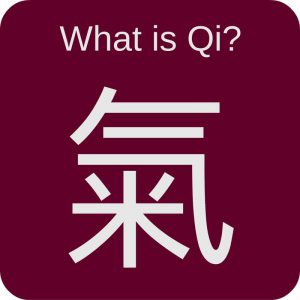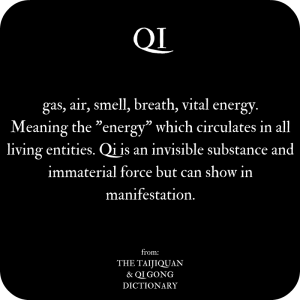“What is Qi?” Various answers to a simple question
Basically as soon as you start with Qi Gong or Taijiquan, you are confronted with the Chinese word “Qi” (氣 or simplified 气, also Ch’i). And of course you will ask: what is Qi?
I guess every teacher and practitioner has his or her own definition of Qi. In the West, it is often translated as “energy” or “vital force”. But there is more to it.
If you have a look at a dictionary, these are the possible direct translations for Qi:
gas / air / smell / weather / to make angry / to annoy / to get angry / vital energy / qi
And beside the direct translation Qi is tied into Chinese philosophy and Traditional Chinese Medicine. Actually you can find many websites filled with (personal) elaborations and explanations of what is Qi.
While I wrote my first book, I had to determine my own definition of Qi. Here is one part of it from The Taijiquan & Qi Gong Dictionary*:
However, I do not want you to rely on MY defintion only. Because there are so many definitions of Qi, I searched for them online and in books. Go through the list below and I am sure you’ll get a better understanding of what is Qi. And I hope you’ll find a definition that suits you and your practice.
“What is Qi?” anwered with quotes
“Qi: a resource so essential it is impossible to define or translate. Qi is not only energy but also the quintessential foundation of the universe.”
The Healing Promise of Qi page vi & vii*
“Ch’i is in everything that is alive. If it doesn’t have Ch’i, it is no longer alive, it will wilt.”
There are no secrets* page 98
“Qi, (also qì or ch’i; gi in Korean, and ki in Japanese) in traditional Chinese culture is an active principle found in any living thing. Qi literally translates as “breath”, “air”, or “gas”, and figuratively as “material energy”, “life force”, or “energy flow”. It is the central underlying principle in traditional Chinese medicine and martial arts. It is comparable to concepts of prana in Hinduism, pneuma in ancient Greece, mana in Hawaiian culture, lüng in Tibetan Buddhism, ruah in Hebrew culture, and vital energy in Western philosophy.”
Wikipedia: Qi
“Many people talk about vital Ch’i energy, the life force, and think it’s enveloped within us. Really, it’s just an extension of the ultimate source of energy which comes from the cosmos. We are part of that – the macrocosmos and the microsomos.”
Talking about Acupuncture* page 17
“Qi is energy in the very broadest sense possible. Qi is universal. Qi embraces all manifestations of energy, from the most material aspects of energy (such as the earth beneath your feet, your computer, and flesh and blood) to the most immaterial aspects (light, movement, heat, nerve impulses, thought, and emotion).”
Source (University of Minnesota)
“Qi, Wade-Giles romanization ch’i (Chinese: “breath,” or “vital energies”), in Chinese philosophy, the ethereal psychophysical energies of which everything is composed. Early Daoist philosophers and alchemists regarded qi as a vital force inhering in the breath and bodily fluids and developed techniques to alter and control the movement of qi within the body; their aim was to achieve physical longevity and spiritual power.
Neo-Confucian philosophers of the Song dynasty (960–1279 ce) regarded qi as emanating from the Great Ultimate (taiji) by way of li, the dynamic ordering pattern of the world. This tradition, whose ideas predominate in traditional Chinese thought, held that qi is manifest through yang (active) and yin (passive) modes as the Five Phases (wuxing; wood, metal, earth, water, and fire), which in turn are the basic processes defining the cosmos.”
Source (Britannica)
Then there are of course many quotes from Taijiquan Chen style (e.g. here). I like this one:
“Qi is usually translated into English as ‘vital energy’ or ‘life force,’ although its literal meaning is ‘breath.’ … Qi exists in the human body without form, color or substance. The ancient Chinese likened it to fire, and early Chinese pictographic characters depicted it as ‘sun’ and ‘fire.’… It is perhaps more easily understood in terms of an electric current.”
Chen Style Taijiquan* page 44-45
And now a quote from the Yang family:
“The meaning of Chi is simply, life! Life is due to the coming together of Chi, and death is due to the dispersion of Chi. It is a force promoting the activity of the human body.”
Source (Yang family)
Now you have read through many definitions of what is Qi. They are all slightly different, but in the end they all talk about 氣.
If you want to know even more about the Chinese character of Qi, it is composed of two character:
气 = qì which means steam; vapor
米 = mǐ which means hulled or husked uncooked rice
Nowadays, in simplified Chinese, you can use only 气 for Qi, but you’ll probably still see 氣 more often.
Happy 氣!
Angelika


